-
ORIGINAL ARTICLE11-22-2024
Transitions experienced by people living with limitations resulting from leprosy: a research-care study
Revista Brasileira de Enfermagem. 2024;77(5):e20230229
Abstract
ORIGINAL ARTICLETransitions experienced by people living with limitations resulting from leprosy: a research-care study
Revista Brasileira de Enfermagem. 2024;77(5):e20230229
DOI 10.1590/0034-7167-2023-0229
Views0See moreABSTRACT
Objective:
to understand the transitional processes that affect the adaptation of people who live with limitations resulting from leprosy.
Methods:
This is a qualitative study based on the precepts of Transition Theory, mediated by care-research, with 24 people with limitations resulting from leprosy in an ex-hospital colony in Piauí. Semi-structured interviews were carried out. The interviews were analyzed using Iramuteq software.
Results:
the researched-caregivers experienced the four types of transitions, including feelings of fear, worry, loneliness, hopelessness, guilt and a tendency to hide the diagnosis. Breakdowns and resignation were revealed, with spirituality, adaptation to the new life situation and acceptance as facilitating conditions for coping with the transitional process, with a consequent improvement in quality of life.
Final considerations:
the transitional processes had a positive significance, since they contributed to adaptation and the achievement of quality of life.
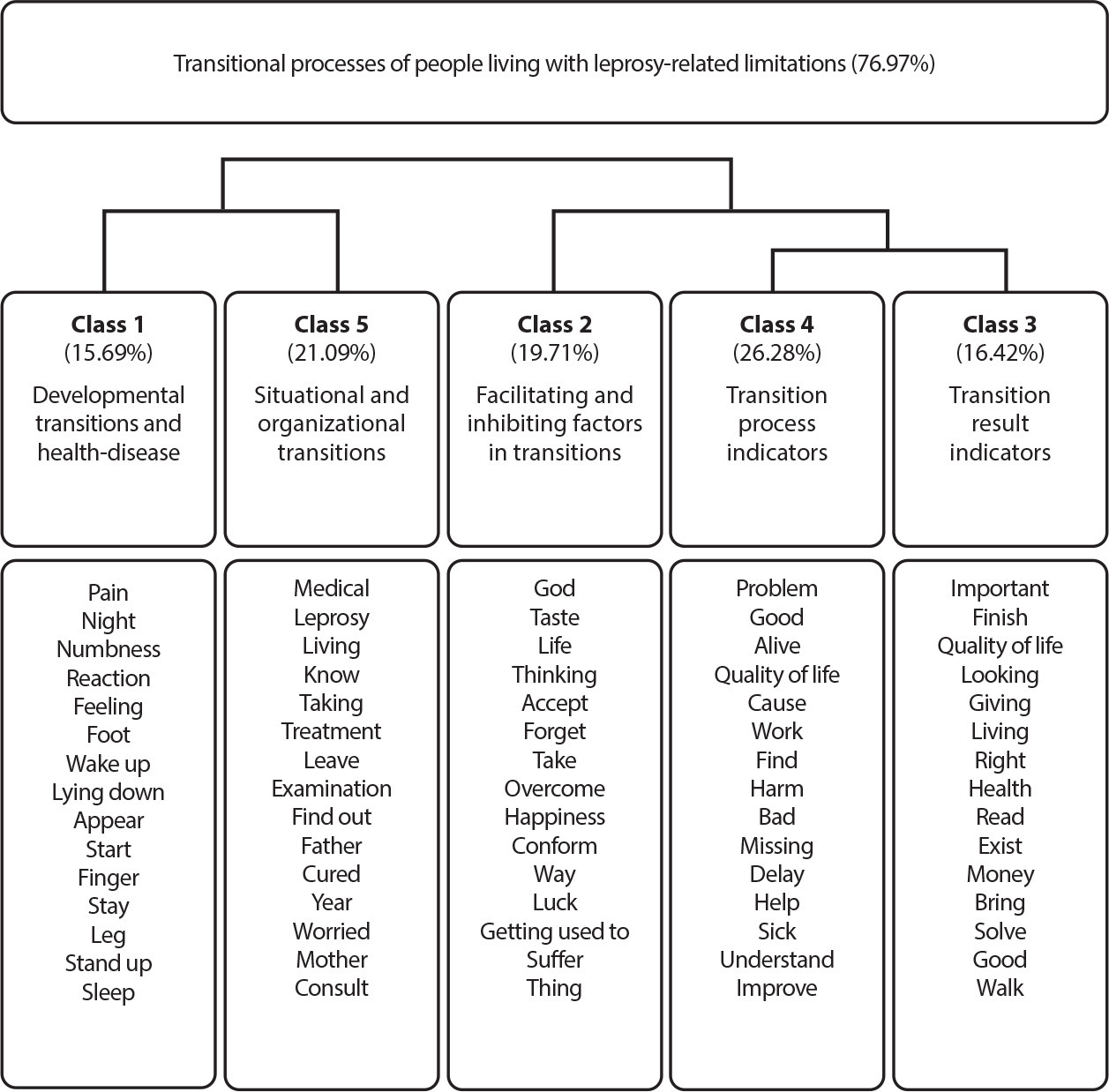
-
11-22-2024
Percepções de pessoas com deficiência física sobre acessibilidade e condições sociais: intervenções para enfermagem de reabilitação
Revista Brasileira de Enfermagem. 2024;77(5):e20240005
Abstract
Percepções de pessoas com deficiência física sobre acessibilidade e condições sociais: intervenções para enfermagem de reabilitação
Revista Brasileira de Enfermagem. 2024;77(5):e20240005
DOI 10.1590/0034-7167-2024-0005
Views0See moreRESUMEN
Objetivos:
analizar las experiencias de personas con discapacidad física adquirida en cuanto a accesibilidad y condiciones sociales; identificar intervenciones de rehabilitación dirigidas por enfermeras para la accesibilidad y condiciones sociales; determinar indicadores sensibles a la enfermería para mejorar la accesibilidad y condiciones sociales.
Métodos:
estudio cualitativo descriptivo-exploratorio utilizó entrevistas semiestructuradas con personas con discapacidad física adquirida mediante muestreo intencionado en bola de nieve para cumplir con todos los objetivos. El análisis de datos siguió los principios del análisis de contenido de Bardin. Los objetivos 2 y 3 se lograron mediante un enfoque teórico reflexivo.
Resultados:
los 27 participantes informaron desafíos de accesibilidad, que impactan las actividades de la vida diaria y las condiciones sociales. Esto influye en la enfermería de rehabilitación, dando lugar a tres campos de intervención: Evaluar la capacidad para realizar actividades diarias y los factores que influyen; Desarrollar e implementar capacitación para la realización de actividades diarias; Promover la movilidad, la accesibilidad y la participación social.
Consideraciones Finales:
a partir de las experiencias de los participantes, identificamos intervenciones de rehabilitación dirigidas por enfermeras para promover la accesibilidad y condiciones sociales.
-
ORIGINAL ARTICLE11-22-2024
Sociodemographic and occupational influences on health professionals’ quality of life
Revista Brasileira de Enfermagem. 2024;77(4):e20240010
Abstract
ORIGINAL ARTICLESociodemographic and occupational influences on health professionals’ quality of life
Revista Brasileira de Enfermagem. 2024;77(4):e20240010
DOI 10.1590/0034-7167-2024-0010
Views0See moreABSTRACT
Objective:
To analyze the sociodemographic and occupational influences on health professionals’ quality of life.
Method:
This descriptive-exploratory, cross-sectional, analytical, and quantitative study addressed 94 health workers, including nursing technicians, nurses, and physical therapists working in Intensive Care Units in a town in the extreme south of Brazil in 2023. The student’s t-test and Spearman correlation were used.
Results:
A significant positive correlation was found between being a woman and the psychological domain and between income and the social and environmental domain while working hours were inversely related to general QoL. Additionally, workload negatively impacted the physical, psychological, and general QOL, furniture negatively influenced the psychological domain, and equipment was negatively associated with the physical and psychological domain.
Conclusion:
The characteristics of the work environment interfere with several areas of quality of life.
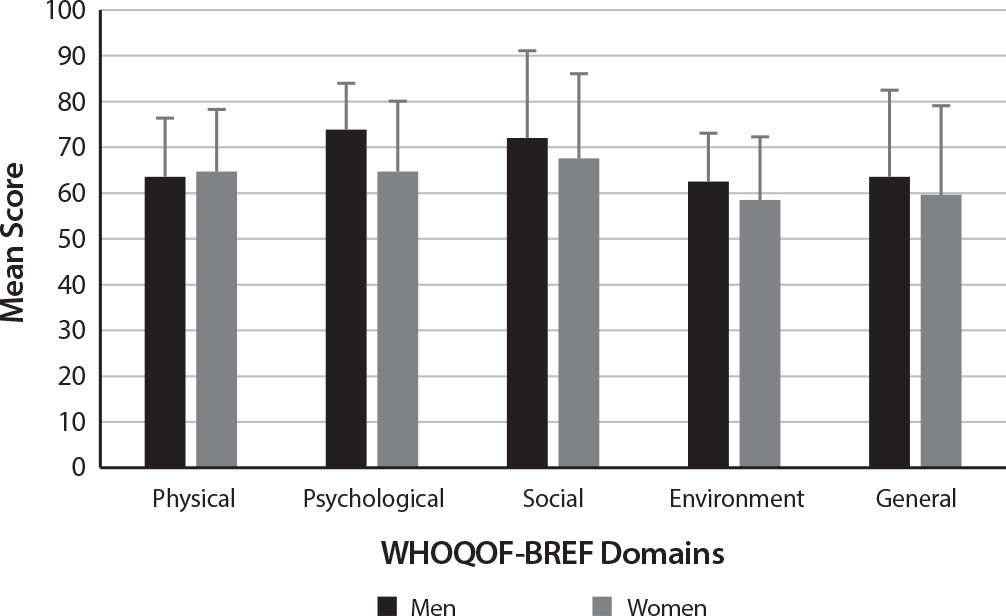
-
REVIEW11-22-2024
Concept analysis of youth: understanding the plurality of subjects
Revista Brasileira de Enfermagem. 2024;77(4):e20240002
Abstract
REVIEWConcept analysis of youth: understanding the plurality of subjects
Revista Brasileira de Enfermagem. 2024;77(4):e20240002
DOI 10.1590/0034-7167-2024-0002
Views0See moreABSTRACT
Objective:
To analyze the concept of “youth.”
Methods:
This is a concept analysis guided by the method proposed by Walker and Avant, operationalized through an integrative literature review. The search in scientific databases was carried out using the descriptors: youth; young; adolescence. To compose the literary corpus, 22 studies were selected.
Results:
Various factors were found in the antecedents that influence the separation of youth groups, contributing to the heterogenization of this population. The attributes include characteristics that comprise the formation of youth groups, especially the idea of shared experiences and social construction, as well as the consequences of the mentioned concept. After systematizing the variables, the analysis was conducted, highlighting the conceptions that influence youth.
Conclusion:
The study demonstrated the multifactorial complexity of the formulation of the concept of youth, highlighting various factors that contribute to this construction. For nursing, this conceptual field allows for an understanding of the population and effective engagement with this group.
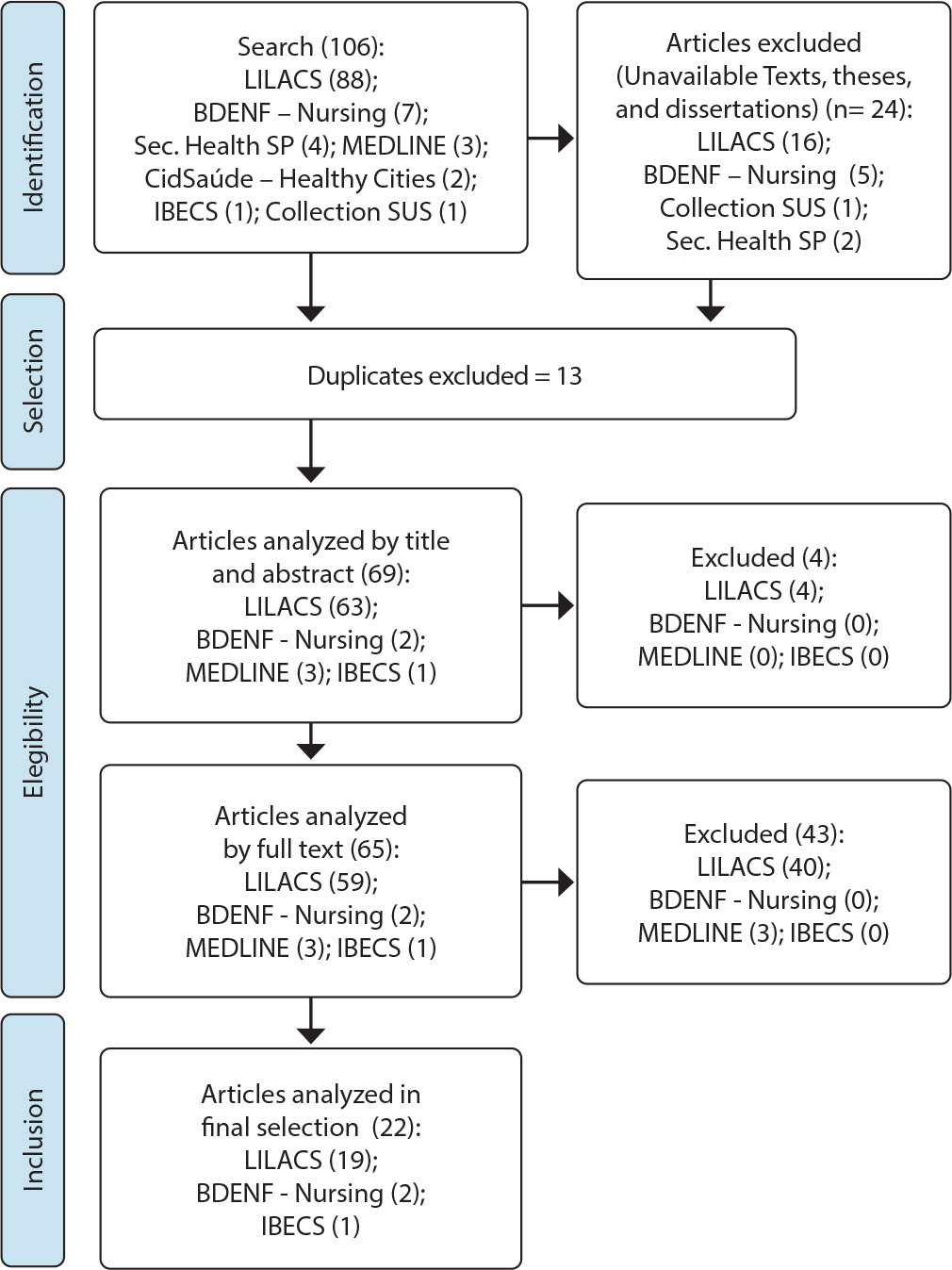
-
ORIGINAL ARTICLE11-22-2024
Temporal trends in neonatal mortality in Pernambuco
Revista Brasileira de Enfermagem. 2024;77(4):e20230451
Abstract
ORIGINAL ARTICLETemporal trends in neonatal mortality in Pernambuco
Revista Brasileira de Enfermagem. 2024;77(4):e20230451
DOI 10.1590/0034-7167-2023-0451
Views0See moreABSTRACT
Objective:
To verify the temporal trend of neonatal mortality in the health regions of Pernambuco between 2000 and 2020.
Method:
A time-series ecological study was conducted, analyzing the total neonatal mortality rate and its early and late components. For regression analysis, Joinpoint Regression was applied, trends were classified, and annual and average percentage changes were calculated for the period, with a significance level of 95%.
Results:
The average neonatal mortality rate in Pernambuco was 11.5 during the studied period. A decreasing trend in neonatal mortality rate was observed, especially in the early component. The region where the state capital is located showed the fastest decrease across all components.
Conclusion:
The temporal trend of neonatal mortality was decreasing; however, the rate of reduction was not uniform across the health regions of the state, and the implementation of the Mãe Coruja Pernambucana Program did not impact the trend in neonatal mortality.
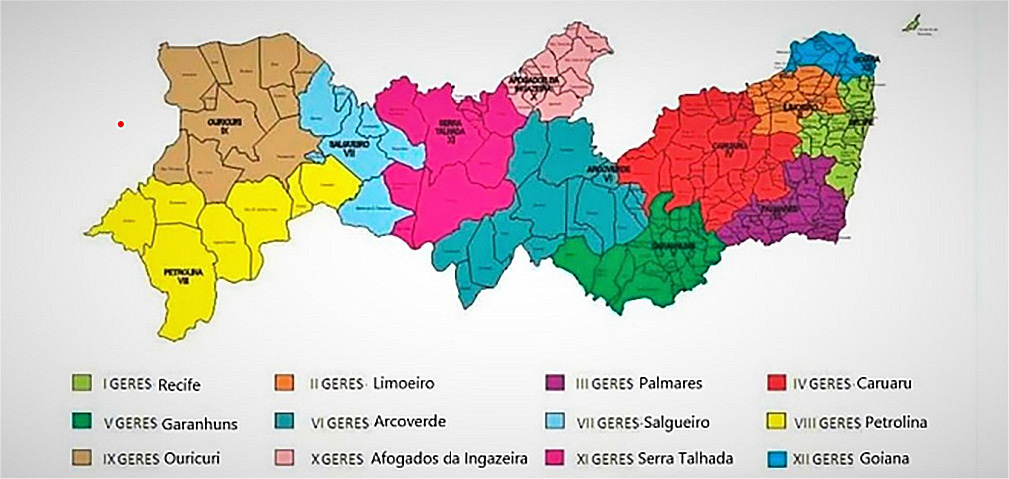
-
ORIGINAL ARTICLE11-22-2024
Evaluation of a video to promote HIV testing in sexual minorities
Revista Brasileira de Enfermagem. 2024;77(4):e20230320
Abstract
ORIGINAL ARTICLEEvaluation of a video to promote HIV testing in sexual minorities
Revista Brasileira de Enfermagem. 2024;77(4):e20230320
DOI 10.1590/0034-7167-2023-0320
Views0See moreABSTRACT
Objective:
To design and evaluate an educational video aimed at promoting HIV testing in gay men from the theoretical perspective of the Nola J. Pender Health Promotion Model.
Methods:
The design comprised five steps: 1.- Literature search; 2.- Formulation of the educational objective; 3.- Drafting of the script and location of the information in the theoretical components; 4.- Production; and 5.- Evaluation by experts and the target population.
Results:
The video “Living Without Fear” was produced, which presents the dilemma faced by gay men before taking a HIV test. The content validity index was 0.85, which indicated that the information was adequate and acceptable for promoting the rapid HIV test.
Final Considerations:
The results contribute to the scientific evidence aimed at promoting healthy behavior. In addition, the video was shown to be an acceptable educational tool.
-
ORIGINAL ARTICLE11-22-2024
Development and validity of a mobile application prototype for hospital shift handover
Revista Brasileira de Enfermagem. 2024;77(4):e20230173
Abstract
ORIGINAL ARTICLEDevelopment and validity of a mobile application prototype for hospital shift handover
Revista Brasileira de Enfermagem. 2024;77(4):e20230173
DOI 10.1590/0034-7167-2023-0173
Views0See moreABSTRACT
Objective:
To develop and validate a mobile application prototype for nursing shift handover in a hospital inpatient unit.
Methods:
A methodological study of technological production, carried out from April 2020 to January 2022, for mobile application construction and validity through the Design Thinking methodology. The study involved the stages of prototype development and validity by experts.
Results:
The application for mobile nursing shift handover obtained a usability score of 79 points and a content validity coefficient of 0.7.
Conclusions:
The instrument obtained an excellent assessment according to usability and agreement among experts. However, future studies are needed to implement this technology in order to assess effectiveness, time optimization and failures during communication.

-
ORIGINAL ARTICLE10-25-2024
Analysis of the vaccination situation against Mpox in people living with HIV/AIDS: an ecological study
Revista Brasileira de Enfermagem. 2024;77(5):e20230234
Abstract
ORIGINAL ARTICLEAnalysis of the vaccination situation against Mpox in people living with HIV/AIDS: an ecological study
Revista Brasileira de Enfermagem. 2024;77(5):e20230234
DOI 10.1590/0034-7167-2023-0234
Views0See moreABSTRACT
Objectives:
to analyze the vaccination situation against Mpox in people living with HIV/AIDS in Brazil.
Methods:
an ecological study on the vaccination status against Mpox in people living with HIV/AIDS (PLWHA) in Brazil. The data were collected in April 2023 through information from the Ministry of Health, using the “Microsoft app Power BI,” which is publicly accessible.
Results:
the data analysis revealed that in Brazil, 2,978 doses of the MVA-BN Jynneos Mpox vaccine were administered in PLWHA, resulting in a vaccination coverage of 18.3%, with the southern and southeastern regions showing the lowest and highest vaccination coverage, respectively. Gender-based evaluation showed a higher proportion of vaccinated males.
Conclusions:
we identified low vaccination coverage in all regions of Brazil, highlighting the need for intensified vaccination activities, especially for PLWHA.
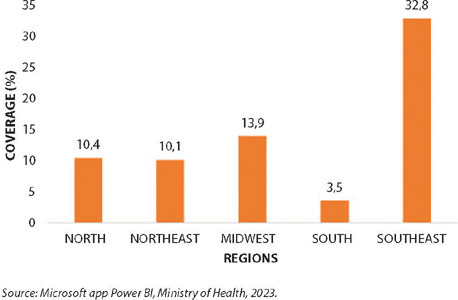
-
REVIEW01-01-2018
Coping strategies for domestic violence against pregnant female adolescents: integrative review
Revista Brasileira de Enfermagem. 2018;71:693-699
Abstract
REVIEWCoping strategies for domestic violence against pregnant female adolescents: integrative review
Revista Brasileira de Enfermagem. 2018;71:693-699
DOI 10.1590/0034-7167-2017-0682
Views0See moreABSTRACT
Objective:
To investigate and analyze in the scientific literature coping strategies for domestic violence against pregnant female adolescents.
Method:
This is an integrative literature review, conducted from July to August 2017 on LILACS, SciELO and PubMed, using the descriptors and the MeSH terms: confrontation, violence, adolescent, pregnant women, prenatal care.
Result:
The sample comprised 9 articles that were organized and characterized according to year, country of study and coping strategy used. The main forms of coping involved the active search for cases and the primary care approach with all family members.
Conclusion:
Individualized prenatal care, the change in professional training and networking activities were pointed out as important components of the strategies for coping with violence against pregnant adolescents.

-
RESEARCH01-01-2018
Repercussions of hospitalization due to fall of the elderly: health care and prevention
Revista Brasileira de Enfermagem. 2018;71:763-769
Abstract
RESEARCHRepercussions of hospitalization due to fall of the elderly: health care and prevention
Revista Brasileira de Enfermagem. 2018;71:763-769
DOI 10.1590/0034-7167-2017-0069
Views0See moreABSTRACT
Objective:
To know the repercussions of the fall reported by the elderly and their caregiver during hospitalization in a public hospital in Florianópolis city from October to December 2014.
Method:
Exploratory research with a qualitative approach, conducted by depth interviews with 16 participants, the eight elderly were hospitalized for falls and eight elderly caregivers. Data analysis were performed through the Thematic Content Analysis.
Results:
It was evidenced the thematic axis: Faller Elderly supported by four thematic categories: Changes caused by Falls, I am a faller, I take care of me and Prevention of the Fall. The repercussions of the fall were evidenced in the impairment of the health condition, self-care and functional capacity. We observed the naturalization of the phenomenon and the passivity with the harmful consequences of the event.
Final Considerations:
The fall is valued the more negative its repercussion, such as the need for hospitalization and surgery. Managing the vulnerability of the elderly, especially in primary care, evaluating their comorbidities and their internal and external environment, will minimize unfavorable consequences and the social and financial cost of hospitalizations.
-
RESEARCH01-01-2018
The adolescent and the institutionalization: understanding the phenomenon and meanings attributed to it
Revista Brasileira de Enfermagem. 2018;71:1373-1380
Abstract
RESEARCHThe adolescent and the institutionalization: understanding the phenomenon and meanings attributed to it
Revista Brasileira de Enfermagem. 2018;71:1373-1380
DOI 10.1590/0034-7167-2017-0242
Views1See moreABSTRACT
Objective:
To understand the meaning of being institutionalized and in conflict with the law for the institutionalized adolescent.
Method:
A qualitative, phenomenological-comprehensive study carried out in a Socio-educational Service Foundation in the northern region of Brazil, with 05 institutionalized adolescents. The analysis was carried out under the understanding of the content suggested by Heidgger, thus allowing the construction of analytical categories for a hermeneutical interpretation.
Results:
Conflicting with the law means something negative and bad for the institutionalized adolescents, in which they understand that although there is deprivation of liberty, the period of hospitalization is an important moment for the reflection on the need to start over.
Conclusion:
The meaning of conflicting with the law goes far beyond a simple word, act or behaviour, it is something that only those who experience the phenomenon are able to unveil, arouse deep feelings and provide reflection to the adolescent about the damages caused by the infraction.
-
RESEARCH01-01-2018
Identification of post-cesarean surgical site infection: nursing consultation
Revista Brasileira de Enfermagem. 2018;71:1395-1403
Abstract
RESEARCHIdentification of post-cesarean surgical site infection: nursing consultation
Revista Brasileira de Enfermagem. 2018;71:1395-1403
DOI 10.1590/0034-7167-2017-0325
Views0See moreABSTRACT
Objective:
To describe the profile of women in relation to their living conditions, health status and socio-demographic profile, correlating it with the presence of signs and symptoms suggestive of post-cesarean surgical site infection, identifying information to be considered in the puerperium consultation performed by nurses and proposing a roadmap for the systematization of care.
Method:
Quantitative, exploratory, descriptive, cross-sectional and retrospective review of medical records of women who had cesarean deliveries in 2014, in the city of São Paulo.
Results:
89 medical records were analyzed, 62 of them with incomplete information. In 11, there was at least one of the signs and symptoms suggestive of infection.
Conclusion:
Given the results of the study, the systematization of puerperal consultation is essential. The roadmap is an instrument that can potentially improve the quality of service and the recording of information.
-
RESEARCH01-01-2018
Nursing laboratory and critical education of nurses: approaches and distances
Revista Brasileira de Enfermagem. 2018;71:1500-1506
Abstract
RESEARCHNursing laboratory and critical education of nurses: approaches and distances
Revista Brasileira de Enfermagem. 2018;71:1500-1506
DOI 10.1590/0034-7167-2017-0339
Views1See moreABSTRACT
Objective:
to analyze the contribution of the laboratory of nursing to the critical education of nurses.
Method:
qualitative study, conducted among 18 professors of higher education institutions, being one public and the other private. Data were collected between February and November of 2016 by means of semi-structured interview. To analyze data, it was used a content analysis in the thematic modality.
Results:
it was observed the emphasis in the technical skills development by propagation of behavior and practices; the creation of bonds between professors and students happens on the limit of good interpersonal relationship; the laboratory of nursing may help the critical reflection about the practice, being a place that allows the learning of ethics.
Final considerations:
the nurse education, carried out by the laboratory of nursing, have to overcome the emphasis in the uncritical reproduction of practices and to observe the nurse’s power to think about the reality in the meaning of its modification.
-
RESEARCH01-01-2018
Introduction of the School Health Program in the city of Cascavel, Paraná State: report of nurses
Revista Brasileira de Enfermagem. 2018;71:1540-1547
Abstract
RESEARCHIntroduction of the School Health Program in the city of Cascavel, Paraná State: report of nurses
Revista Brasileira de Enfermagem. 2018;71:1540-1547
DOI 10.1590/0034-7167-2017-0188
Views1See moreABSTRACT
Objective:
to understand the introduction of the School Health Program in the city of Cascavel, Paraná State, as opposed to the report of nurses.
Method:
a qualitative study with fifteen participants. The data were collected from April to August 2015, through semi-structured interviews, analyzed by content analysis and thematic modality.
Results:
the category “Introduction process” of the School Health Program integrates the subcategories “Identified health problems” and the “Challenges of intersectoriality”. The program was implemented quickly, with a fragile training of professionals to perform in the phases that compose it. Structural conditions of schools, human and material resources, and emerging intersectoral interaction were identified obstacles. The integration of the health, school, and family constitutes the program’s potentiality.
Final considerations:
it is understood that the actions of the program were based on health assessments of students, and it is necessary for professionals and managers to discuss and analyze the obstacles identified to achieve all the proposed objectives.
-
RESEARCH01-01-2018
Knowledge about precautions in Primary Health Care: tool validation
Revista Brasileira de Enfermagem. 2018;71:1589-1595
Abstract
RESEARCHKnowledge about precautions in Primary Health Care: tool validation
Revista Brasileira de Enfermagem. 2018;71:1589-1595
DOI 10.1590/0034-7167-2017-0886
Views0See moreABSTRACT
Objective:
To elaborate and validate a tool to assess knowledge and behavior of nursing professionals about standards and specific precautions in the Primary Health Care.
Method:
Methodological study of the elaboration and validation of the tool by thirteen experts judges, using a Likert scale of 4 points, with Content Validity Index ≥ 0.80, on clarity, relevance and pertinence.
Results:
A tool composed of 47 dichotomous questions to assess knowledge and 12 questions, with five options of answers, for the referred behavior. In the validation, only one item was deleted, related to the “Hands Hygiene” axis and one item was reformulated, regarding “Use of Common Gloves” and another 11 changed writing. The tool as a whole was assessed for relevance, comprehensiveness and representativeness within the scope of the topic investigated.
Conclusion:
The developed tool has been validated and is now available for use in Primary Health Care.
-
RESEARCH01-01-2018
Training in diabetes education: meanings attributed by primary care nurses
Revista Brasileira de Enfermagem. 2018;71:1611-1618
Abstract
RESEARCHTraining in diabetes education: meanings attributed by primary care nurses
Revista Brasileira de Enfermagem. 2018;71:1611-1618
DOI 10.1590/0034-7167-2017-0792
Views1See moreABSTRACT
Objective:
seize meanings attributed by primary care nurses to training in diabetes education.
Method:
exploratory and descriptive study, with a qualitative approach, with twenty primary care nurses; semistructured interview script, with interviews processed in the IRaMuTeQ software and analyzed through the Descending Hierarchical Classification. The results were subsidized in the Representational Theory of Meaning.
Results:
nurse training in diabetes education is insufficient for holistic action, although it allows the community to be instrumentalized in specific issues about the disease, using the limited tools available, especially lectures. Nurses find themselves in a context of challenges, improvisations, weaknesses, and limitations that determine the meaning attributed to diabetes education and subsequent actions.
Conclusion:
the meanings attributed by the nurses revealed an incipient training, which limits the quality of care provided and instigates the search for qualification.

-
09-16-2019
Nursing practices centered on individuals with tuberculosis: an interface with democracy
Revista Brasileira de Enfermagem. 2019;72(5):1219-1225
Abstract
Nursing practices centered on individuals with tuberculosis: an interface with democracy
Revista Brasileira de Enfermagem. 2019;72(5):1219-1225
DOI 10.1590/0034-7167-2017-0380
Views0See moreABSTRACT
Objective:
To analyze whether user-centered nursing practices in TB DOT are being carried out and are contributing to democracy.
Method:
A cross-sectional, exploratory, descriptive study with 123 nurses in three capital cities with high incidence of TB (Manaus-AM, João Pessoa-PB, Porto Alegre-RS) in Brazil. Data were collected from January to June 2014. Descriptive and multiple correspondence analyzes were used.
Results:
It was identified that the most user-centered care actions had scores below 50%, considered unfavorable to the exercise of democracy. In the analysis of the general user-centered practice score per municipality, Manaus and João Pessoa presented unfavorable results, and the municipality of Porto Alegre was partially favorable.
Conclusion:
The three municipalities need to advance in the implementation of user-centered practices in DOT, because their health system still has difficulties and challenges to overcome.
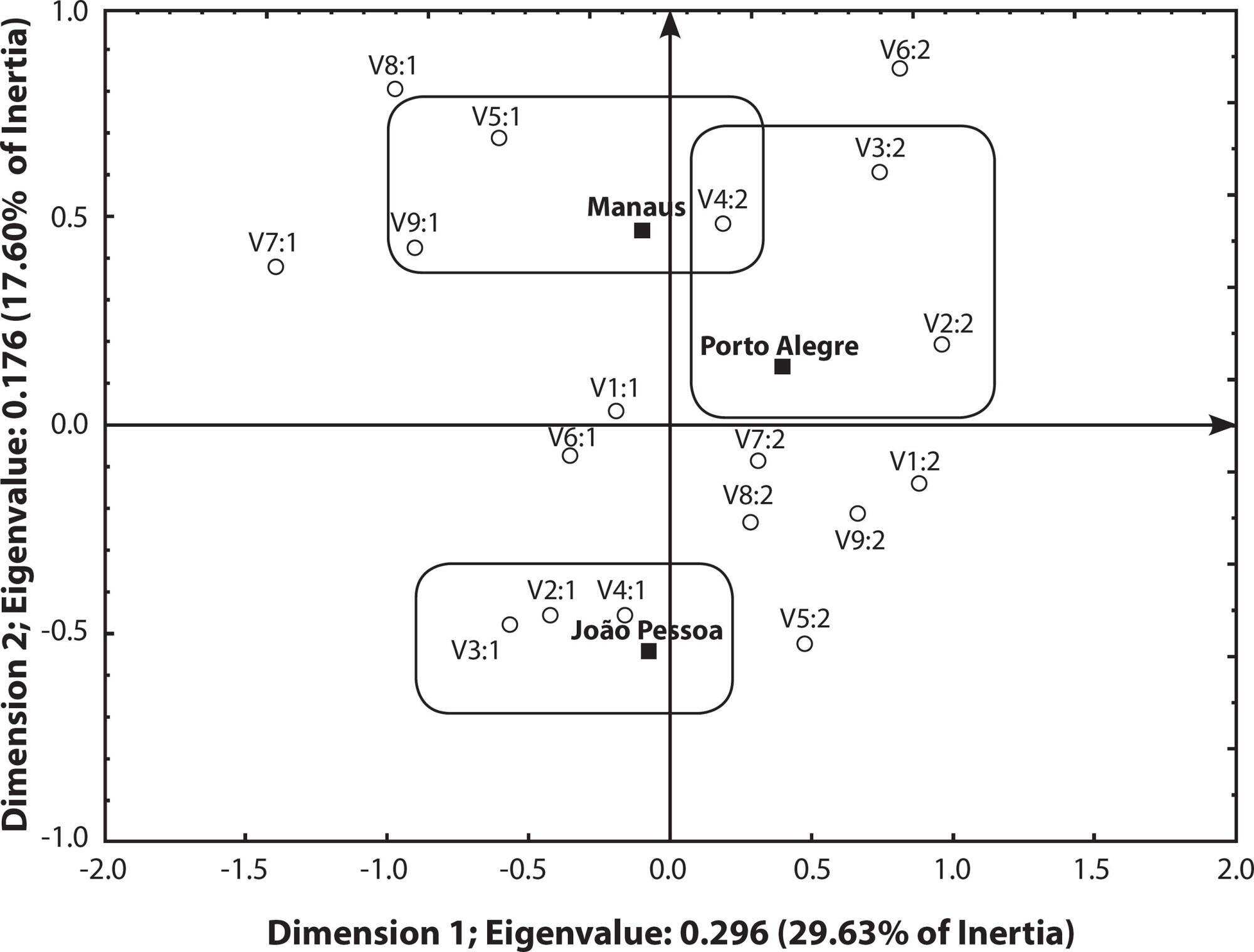
-
ORIGINAL ARTICLE08-10-2020
Palliative care consultation team: symptom relief in first 48 hours of hospitalization
Revista Brasileira de Enfermagem. 2020;73(6):e20190391
Abstract
ORIGINAL ARTICLEPalliative care consultation team: symptom relief in first 48 hours of hospitalization
Revista Brasileira de Enfermagem. 2020;73(6):e20190391
DOI 10.1590/0034-7167-2019-0391
Views0See moreABSTRACT
Objective:
To compare the relief of symptoms provided by palliative care consultation team (PCCT) compared to the traditional care team (TC), in patients with advanced cancer in the first 48 hours of hospitalization.
Method:
Allocated to PCCT Group and TC Group, this study assessed 290 patients according to the Edmonton Symptom Assessment System (ESAS) within the first 48 hours of hospitalization. The main outcome was a minimum 2-point reduction in symptom intensity.
Results:
At 48 hours, the PCCT Group had a 2-point reduction in the mean differences (p <0.001) in pain, nausea, dyspnea, and depression; and TC Group, on nausea and sleep impairment (p <0.001). Multiple Logistic Regression found for the PCCT Group a greater chance of pain relief (OR 2.34; CI 1.01-5.43; p = 0.049).
Conclusion:
There was superiority of the PCCT Group for pain relief, dyspnea and depression. There is a need for more studies that broaden the understanding of team modalities.
-
ORIGINAL ARTICLE10-21-2019
Work overload and risk behaviors in motorcyclists
Revista Brasileira de Enfermagem. 2019;72(6):1479-1484
Abstract
ORIGINAL ARTICLEWork overload and risk behaviors in motorcyclists
Revista Brasileira de Enfermagem. 2019;72(6):1479-1484
DOI 10.1590/0034-7167-2018-0279
Views0See moreABSTRACT
Objective:
to analyze the association between work overload and risk behaviors adopted by motorcyclists.
Method:
a cross-sectional study of injured motorcycle drivers hospitalized at the Hospital da Restauração Governador Paulo Guerra in the city of Recife, PE, from May to September 2016. A questionnaire was applied containing sociodemographic variables related to work overload and risk behaviors adoption. Odds Ratio (OR) and 95% Confidence Interval were used to analyze the association between the variables.
Results:
there was a predominance of males (97.6%), mean age 31.44 years (SD = 9.50). There was an association of sleep/fatigue at the accident time with difficulties carrying out work tasks (OR = 3.7), feeling tired during work (OR = 4.6) and feeling under pressure to carry out work tasks (OR = 3.5).
Conclusion:
work overload was associated with risk behaviors adoption. It is believed that this fact can have an impact on the occurrence and severity of accidents.
-
ORIGINAL ARTICLE02-05-2021
Homeless people: health aspects and experiences with health services
Revista Brasileira de Enfermagem. 2021;74(1):e20190200
Abstract
ORIGINAL ARTICLEHomeless people: health aspects and experiences with health services
Revista Brasileira de Enfermagem. 2021;74(1):e20190200
DOI 10.1590/0034-7167-2019-0200
Views0See moreABSTRACT
Objectives:
to analyze the understanding of homeless people living in a city in the countryside of São Paulo about what health is and about their experiences in health services.
Methods:
a qualitative exploratory study developed through interviews with homeless people and a field diary. The data were organized by themes and the findings were compared to a collective health framework.
Results:
the explored themes were: “Being healthy for the homeless population”, “The search for health services” and “Being a user of health services from the perspective of homeless people”. We present the interviewees’ understanding of health and their experiences in healthcare services. Along this path, we outline aspects that show the network’s weaknesses, permeated by prejudices and discrimination.
Final Considerations:
this population has conceptions about health and needs that need to be singularly taken into consideration to facilitate access and care.
-
ORIGINAL ARTICLE02-17-2020
Professional who attended childbirth and breastfeeding in the first hour of life
Revista Brasileira de Enfermagem. 2020;73(2):e20180448
Abstract
ORIGINAL ARTICLEProfessional who attended childbirth and breastfeeding in the first hour of life
Revista Brasileira de Enfermagem. 2020;73(2):e20180448
DOI 10.1590/0034-7167-2018-0448
Views0See moreABSTRACT
Objectives:
To investigate the association between the professionals who attended vaginal delivery and breastfeeding in the first hour of life.
Methods:
This is a cross-sectional study with data from the Nascer no Brasil (Born in Brazil) survey, conducted in the 2011-2012 period. Data from 8,466 puerperae were analyzed using a logistic regression model with a hierarchical approach.
Results:
The proportion of mothers who breastfed at birth was higher in deliveries attended by nurses (70%). A nurse-assisted delivery was 64% more likely to breastfeed in the first hour of life. Other factors associated with the outcome: residing in the North; age less than 35 years; multiparity; prenatal guidance on breastfeeding in the first hour of life; birth at Baby-Friendly Hospital; companion at birth; and female newborn.
Conclusions:
Obstetrician nurse/nurse-assisted delivery was a significant independent factor associated with breastfeeding in the first hour of life, suggesting the importance of strengthening the role of the obstetrician nurse.
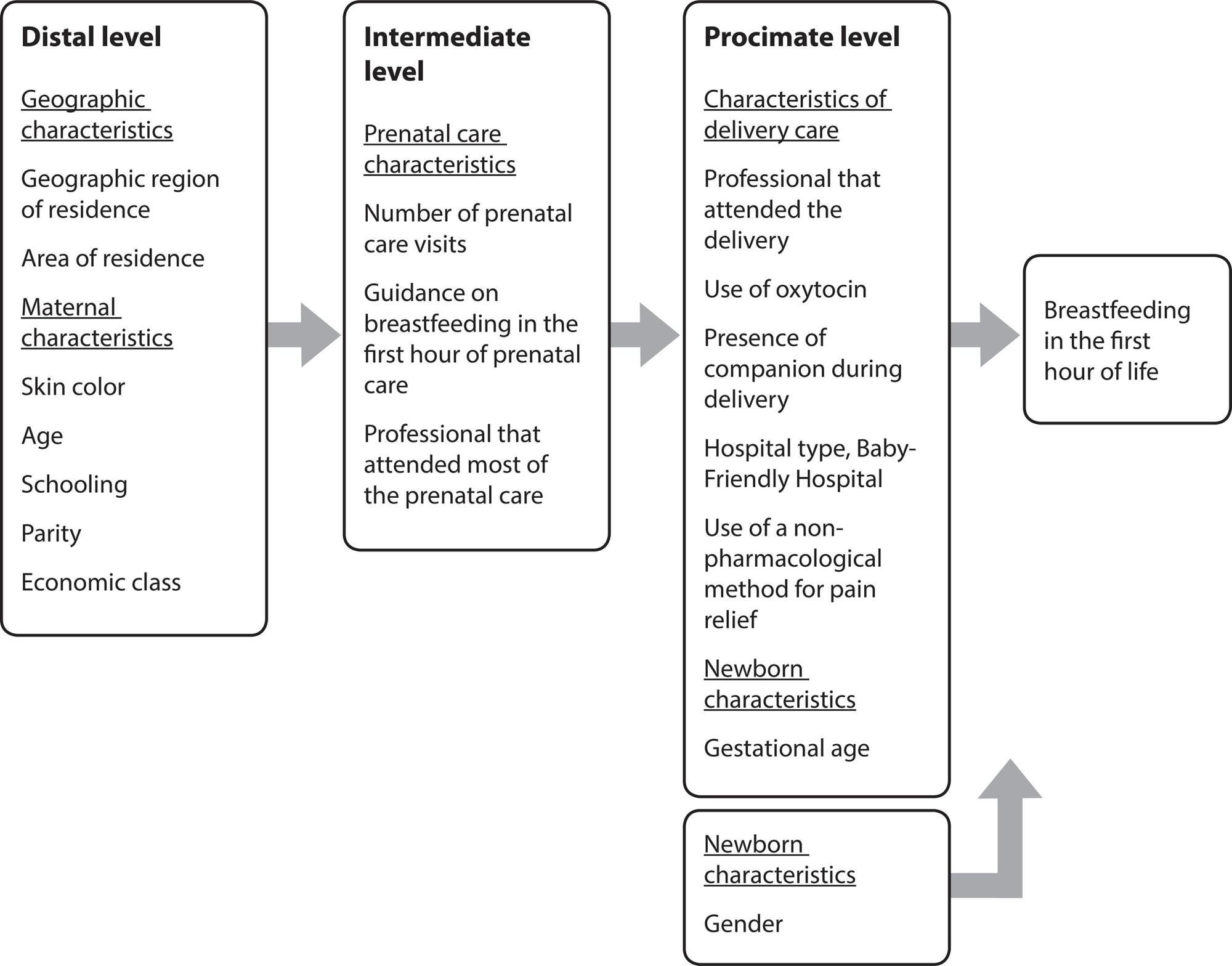
-
ORIGINAL ARTICLE02-17-2020
Predictive model of hospitalization for children and adolescents with chronic disease
Revista Brasileira de Enfermagem. 2020;73(2):e20180467
Abstract
ORIGINAL ARTICLEPredictive model of hospitalization for children and adolescents with chronic disease
Revista Brasileira de Enfermagem. 2020;73(2):e20180467
DOI 10.1590/0034-7167-2018-0467
Views0See moreABSTRACT
Objectives:
Describe a predictive model of hospitalization frequency for children and adolescents with chronic disease.
Methods:
A decision tree-based model was built using a database of 141 children and adolescents with chronic disease admitted to a federal public hospital; 18 variables were included and the frequency of hospitalization was defined as the outcome.
Results:
The decision tree obtained in this study could properly classify 80.85% of the participants. Model reading provided an understanding that situations of greater vulnerability such as unemployment, low income, and limited or lack of family involvement in care were predictors of a higher frequency of hospitalization.
Conclusions:
The model suggests that nursing professionals should adopt prevention actions for modifiable factors and authorities should make investments in health promotion for non-modifiable factors. It also enhances the debate about differentiated care to these patients.

-
ORIGINAL ARTICLE12-04-2020
Effectiveness of therapeutic groups in psychosocial care: analysis in the light of yalom’s therapeutic factors
Revista Brasileira de Enfermagem. 2020;73:e20200410
Abstract
ORIGINAL ARTICLEEffectiveness of therapeutic groups in psychosocial care: analysis in the light of yalom’s therapeutic factors
Revista Brasileira de Enfermagem. 2020;73:e20200410
DOI 10.1590/0034-7167-2020-0410
Views0See moreABSTRACT
Objective:
to describe professionals’ perceptions about the therapeutic effectiveness of group care.
Method:
a descriptive, exploratory, qualitative research of the type of intervention carried out with 30 professionals from Psychosocial Care Centers for Alcohol and Drugs in a municipality in center-westerns Brazil, from March to April 2019. Self-applicable instruments and round circles were used. The emerging data were submitted to content analysis.
Results:
professionals perceive the benefits of group practices and relate them to some therapeutic factors in the group. It is evident the little formal and systematized knowledge about the group process elements.
Final Considerations:
the therapeutic effectiveness of group processes is compromised due to absence of systematic records that allow to perceive the therapeutic progress of users, even though professionals perceive the emergence of therapeutic factors of the groups in the context of psychosocial care.
-
REVIEW03-30-2020
Care of the self in the daily living of nurses: an integrative review
Revista Brasileira de Enfermagem. 2020;73(2):e20180668
Abstract
REVIEWCare of the self in the daily living of nurses: an integrative review
Revista Brasileira de Enfermagem. 2020;73(2):e20180668
DOI 10.1590/0034-7167-2018-0668
Views0See moreABSTRACT
Objectives:
to identify if nurses care for themselves and describe such practices.
Methods:
this is an integrative review of the literature published between 2006 and 2018 and indexed in the Literatura Latino-Americana e do Caribe em Ciências da Saúde, Medical Literature Analysis and Retrieval System Online and Web of Science databases.
Results:
the sample totaled 20 articles, grouped by content similarity in the thematic categories “limits and possibilities for the care of the self”, “knowledge about practices on the care of the self” and “implications of care of the self in professional practice”.
Final considerations:
the knowledge about techniques on caring for the self allows nurses to develop themselves personally and professionally. We suggest to managers and administrators a redirection of the nursing practice that contemplates the strengthening of the nurse as the manager of care and leader of the team, as well as the inclusion of the concept of care of the self in the curricula of undergraduate and graduate nursing courses.
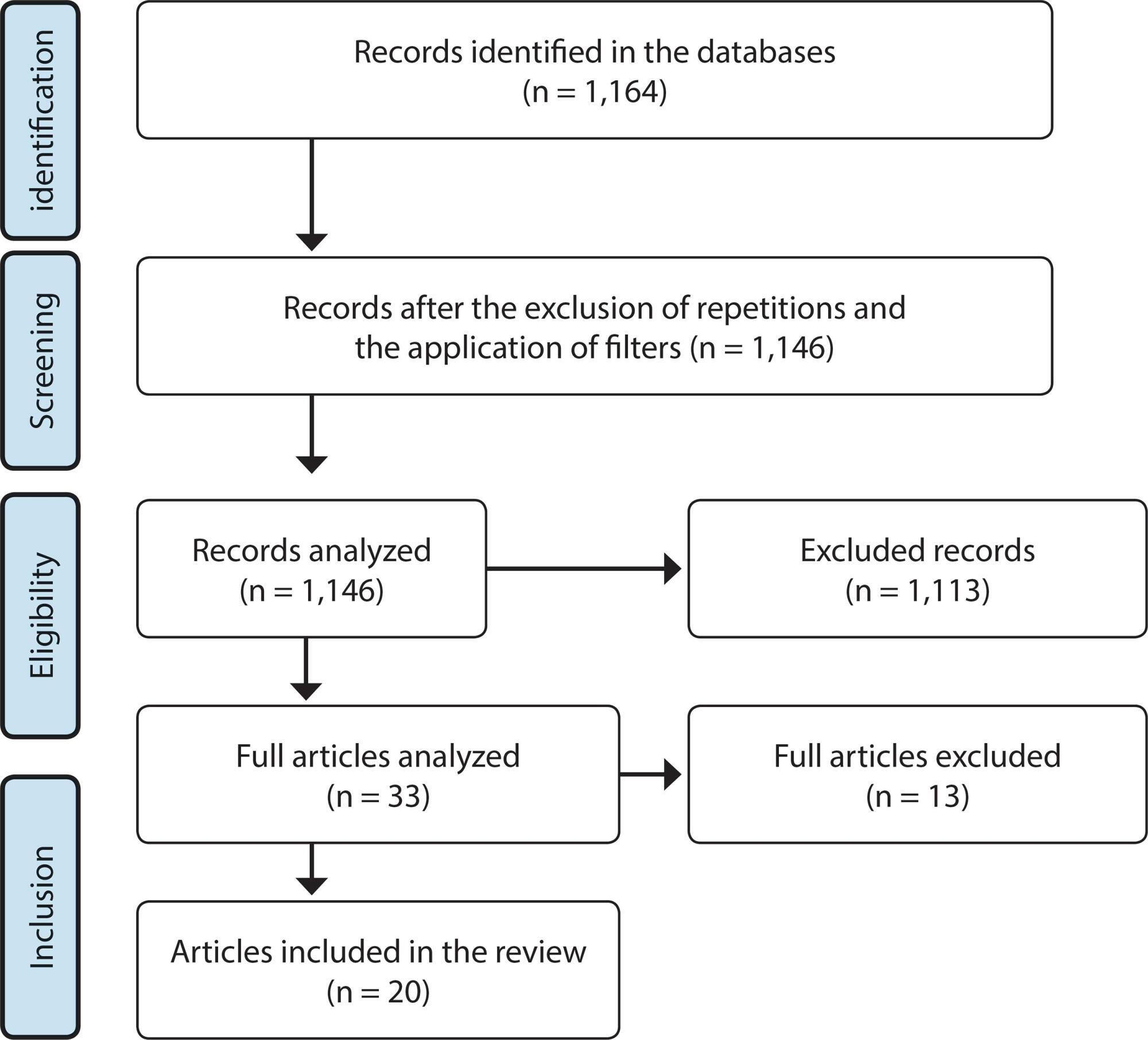
Search
Search in:
Nuvem de Tags
Adolescente (85) Atenção Primária à Saúde (239) COVID-19 (91) Criança (91) Cuidados de Enfermagem (269) Educação em Enfermagem (151) Educação em Saúde (139) Enfermagem (930) Enfermagem Pediátrica (86) Estudantes de Enfermagem (77) Estudos de Validação (131) Família (87) Idoso (208) Promoção da Saúde (99) Qualidade de Vida (104) Saúde do Trabalhador (86) Saúde Mental (145) Saúde Pública (82) Segurança do Paciente (150) Tecnologia Educacional (100)



